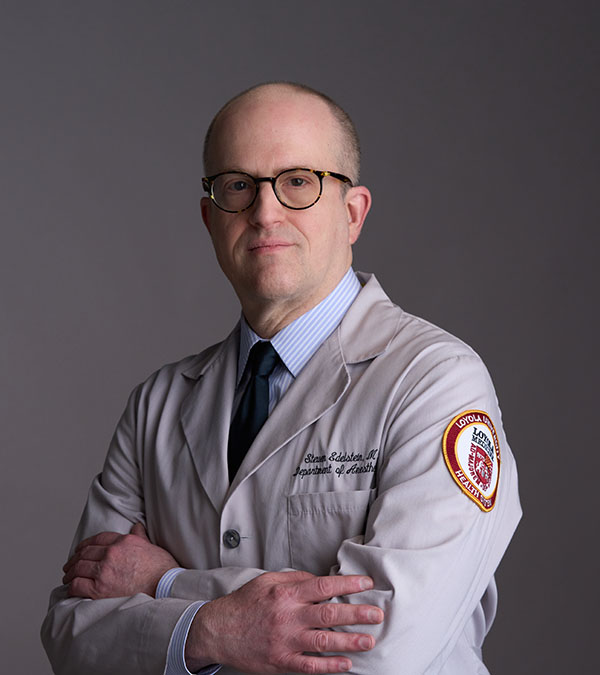 Steven B. Edelstein, MD, is Professor and Chair of the Department of Anesthesiology and Perioperative Medicine at Loyola Medicine, a regional, academic health system based in Chicago’s western suburbs and part of Trinity Health, one of nation’s largest Catholic health systems. He is also a distinguished alum of our department. Dr. Edelstein graduated from our anesthesiology residency program in 1993 and served as a faculty member in our department from 1993 to 1997. Additionally, he is a generous donor to our department’s alumni fund.
Steven B. Edelstein, MD, is Professor and Chair of the Department of Anesthesiology and Perioperative Medicine at Loyola Medicine, a regional, academic health system based in Chicago’s western suburbs and part of Trinity Health, one of nation’s largest Catholic health systems. He is also a distinguished alum of our department. Dr. Edelstein graduated from our anesthesiology residency program in 1993 and served as a faculty member in our department from 1993 to 1997. Additionally, he is a generous donor to our department’s alumni fund.
Dr. Edelstein caught up with us recently to share what he’s been up to and reminisce about his time in Pittsburgh.
What is your area of focus and educational background?
I did my undergraduate training at the University of Kentucky with a focus on chemistry. My medical school education was at the University of Cincinnati. Then I matched into the anesthesiology residency at UPMC. During my time at UPMC, I focused on cardiothoracic and liver transplantation anesthesiology.
How did your training prepare you for your current position?
After completing my training, I joined the University Anesthesiology and Critical Care Medicine (UACCMF) group, which is now part of UPMC, as a member of the faculty. My clinical assignment was with the team at the Department of Veterans Affairs Pittsburgh Healthcare System (VAPHS) Oakland campus, which had a focus on cardiac and liver transplantation. In addition, I became involved in the UPMC Anesthesiology Residency administration and served as Associate Program Director. All these experiences prepared me for my career change that led me to Loyola University Medical Center (LUMC). Since coming to LUMC, I’ve helped create our liver transplant anesthesiology program and become involved in numerous organizational roles. Ultimately, I was selected to be the Vice Chair and served in that position for many years. I assumed the role of Chair in 2019.
What was your most memorable time as a trainee?
That's a tough question to answer since there were so many experiences. The residency was structured so that trainees rotated through several hospitals, each with its own set of faculty and experiences. This truly prepared me for any clinical challenge I would face in my future career. The people (faculty, students, residents, CRNAs) made the place shine. I always look back fondly on the many individuals I had the pleasure to work with and learn from.
Who (mentor/peer) from the program made the biggest impact on your training, and why?
I would have to say Dr. Richard Bjerke, former Chief of the VAPHS Oakland Anesthesiology Service. He took a chance on me as a new graduate, was an excellent mentor, and truly cared about his colleagues. He valued the clinical educator and helped form a great team at the VA. I always consider those times some of the most formative in my career.
What recommendations or advice would you give to an incoming resident?
Try to appreciate the experiences that you will be getting and view these clinical cases as learning opportunities. The large depth and breadth of the UPMC anesthesiology department allows you to see so many approaches to anesthesia. Ultimately, it will help you determine what works best for you and your patients. Also, take time to appreciate your fellow trainees, not just in anesthesiology, but also throughout the organization.
What was your favorite spot in Oakland (or Pittsburgh) to go to?
In Oakland/Shadyside, I would have to say it was Mad Mex restaurant. It was a new concept at the time (part of the Big Burrito Group) and as a restaurant, was far better than “The O," a.k.a. The Original Hot Dog Shop, which I never understood (I think it's also now closed). Other experiences included the Civic Arena (getting to see the Penguins in their glory days of Jaromir Jagr and Mario Lemieux), Three Rivers Stadium (though now it has been replaced by far better facilities), and of course, coming through the Fort Pitt tunnel the first time.
